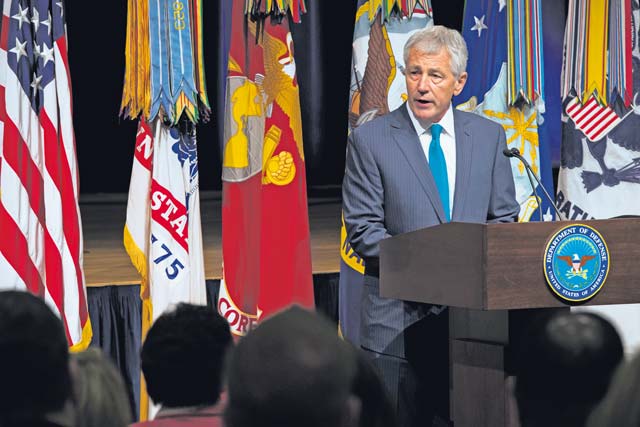
Defense Secretary Chuck Hagel addresses the audience before introducing Valerie Jarrett, senior advisor to President Barack Obama, at a Lesbian, Gay, Bisexual, Transgender Pride Month event June 25 at the Pentagon. Hagel stated that since the repeal of the “Don’t Ask, Don’t Tell” law, the Defense Department and the military have become stronger.
WASHINGTON, June 25, 2013 — Noting that democracy, while imperfect, can change and has changed for the better, Defense Secretary Chuck Hagel today called gay and lesbian service members “integral to America’s armed forces” during a Pentagon Lesbian, Gay, Bisexual and Transgender Pride Month event.
In remarks to an audience of several hundred in the Pentagon auditorium more than a year since the repeal of the law that forbade gay and lesbian service members to serve openly, Hagel noted strides toward equality for all men and women who serve.
“Our nation has always benefited from the service of gay and lesbian Soldiers, Sailors, Airmen and Marines,” the secretary said. “Now they can serve openly, with full honor, integrity and respect.”
Hagel acknowledged obstacles that nation faces as it moves closer to fulfilling its founding vision: that all are created equal.
“It has never been easy to square the words of our forefathers with the stark realities of history,” the secretary said. “But what makes America unique, what gives us strength, is our ability to correct our course.”
Hagel urged citizens to take pride in the role the U.S. military has played in this endeavor, but also noted the need for courageous leaders willing to stand up for what they believe.
He introduced keynote speaker Valerie Jarrett, senior advisor to President Barack Obama, and long-time champion of equality for gays and lesbians.
In late 2010, Jarrett recounted, she hosted a meeting at the White House with a small group of active duty gay and lesbian service members and several veterans who had been discharged. Meanwhile, Congress was in the midst of a debate on the repeal of “Don’t Ask, Don’t Tell.”
“At that point, there was not a clear path to victory,” Jarrett said. Still, the service members shared their stories about what it was like to serve in the military and why hiding who they were was so difficult, she recalled.
“I’ll never forget the young woman who said she and her girlfriend lived in a perpetual state of fear of accidentally saying the wrong thing or doing something that might give away their secret,” Jarrett said. “I’ll never forget the veteran who said he couldn’t even be honest about who he was with his own family, because he didn’t want to ask them to lie for him.”
Nonetheless, they all expressed their love of country and a deep sense of patriotism that motivated them to serve, Jarrett said.
She explained she also had the support of the president, who pledged to move the repeal forward so that “the next time these men and women came to the White House, they could do so in uniform, proudly and openly with their heads held high and their loved ones at their side.”
The eventual repeal is part of change, Jarrett said, and has been a linear theme during her time at the White House. “It is one of the most significant civil rights accomplishments of the president’s career,” she said.
Since the September 2011 repeal of the law banning openly gay service, Jarrett said, she continues to engage with the gay and lesbian military community and their families, citing one spouse who lived in what she called a “circle of silence” throughout her wife’s career and deployment.
Today, Tracey Hepner leads the Military Partners and Families Coalition, a campaign for same-sex partners of military service members and veterans. She also pinned on the stars of her wife, Army Reserve Brig. Gen. Tammy Smith, the first openly gay U.S. flag officer to “come out” while serving since the repeal.
These stories and others like it, Jarrett asserted, illustrate why progress is so vital to the nation and the military.
“Change is being able to put your family photo on your desk, just like everyone else,” Jarrett said.
“Change is being able to share with your co-workers about your weekend or vacation plans. … Change is knowing that you’re free to be who you are and love whomever you want without fear of harassment or losing your job. It’s being able to openly embrace your partner in front of all the other families when he or she returns from a tour of duty, just like everyone else.”
The repeal of “Don’t Ask Don’t Tell” was the beginning, but not the end of the process, she added.
The president has directed DOD to identify more than 20 additional benefits that could be extended to same-sex domestic partners and their children without any additional changes to federal law, Jarrett said. The benefits — which include identification cards, access to commissaries and base exchanges, joint duty assignments, child care and legal assistance — all are projected for implementation this fall, she added.
Jarrett also said efforts continue to ensure women and men feel safe from sexual harassment and assault.
“We are determined to stop these crimes, because they have no place in the greatest military on Earth,” Jarrett said. “How can we be the very best in the world if we’re attacking our own?”
From achieving landmark racial integration to recognizing that being honest about sexual orientation should not disqualify people from serving, the Defense Department will continue to protect all qualified Americans who are willing to work hard and put mission first, Jarrett said.
“Our military has proven again and again that it is the most professional and capable fighting force the world has ever seen and it can readily adapt to both challenge and change,” she added. “Fighting for your country is fundamentally about honor, patriotism, dedication and service. It’s not about stereotypes.


